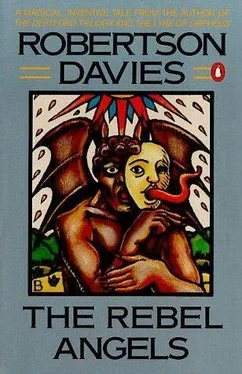Robertson Davies - The Rebel Angels
Здесь есть возможность читать онлайн «Robertson Davies - The Rebel Angels» весь текст электронной книги совершенно бесплатно (целиком полную версию без сокращений). В некоторых случаях можно слушать аудио, скачать через торрент в формате fb2 и присутствует краткое содержание. Жанр: Триллер, на английском языке. Описание произведения, (предисловие) а так же отзывы посетителей доступны на портале библиотеки ЛибКат.
- Название:The Rebel Angels
- Автор:
- Жанр:
- Год:неизвестен
- ISBN:нет данных
- Рейтинг книги:5 / 5. Голосов: 1
-
Избранное:Добавить в избранное
- Отзывы:
-
Ваша оценка:
- 100
- 1
- 2
- 3
- 4
- 5
The Rebel Angels: краткое содержание, описание и аннотация
Предлагаем к чтению аннотацию, описание, краткое содержание или предисловие (зависит от того, что написал сам автор книги «The Rebel Angels»). Если вы не нашли необходимую информацию о книге — напишите в комментариях, мы постараемся отыскать её.
The Rebel Angels — читать онлайн бесплатно полную книгу (весь текст) целиком
Ниже представлен текст книги, разбитый по страницам. Система сохранения места последней прочитанной страницы, позволяет с удобством читать онлайн бесплатно книгу «The Rebel Angels», без необходимости каждый раз заново искать на чём Вы остановились. Поставьте закладку, и сможете в любой момент перейти на страницу, на которой закончили чтение.
Интервал:
Закладка:
It was Hollier who found four large packages in brown paper stacked in a bathtub, thick in dust. When the dust was brushed away (and Hollier, who was sensitive to dust, suffered in doing it) he found that the packages were labelled, in Cornish's beautiful hand, "P. Picasso Lithographs – be sure your hands are clean before opening."
My own Aladdin's cave was apartment number three, where the books and manuscripts were. That is, I tried to make it mine, but Hollier and McVarish insisted on snooping; it was impossible to keep scholars away from such a place. Books were heaped on tables and under tables – big folios, tiny duodecimos, every sort of book ranging from incunabula to what seemed to be a complete collection of first editions of Edgar Wallace. Stacks of books like chimneys rose perilously from the floor and were easily knocked over. There were illuminated books, and a peep was all that was necessary to discover that they were of great beauty; Cornish must have bought them forty years ago, for such things are hardly to be found now, for any money. There were caricatures and manuscripts, including fairly modern things; there was enough stuff by Max Beerbohm alone – marvellous unpublished mock portraits of royalty and of notabilities of the nineties and the early nineteen-hundreds – for a splendid exhibition, and my heart yearned towards these. And there was pornography, upon which McVarish pounced with snorts of glee.
I know little of pornography. It does not stir me. But McVarish seemed to know a great deal. There was a classic of this genre, nothing less than a fine copy of Aretino's Sonnetti Lussuriosi, with all the original plates by Giulio Romano. I had heard of this erotic marvel, and we all had a good look. I soon tired of it because the pictures – which McVarish invariably referred to as "The Postures" – illustrated modes of sexual intercourse, although the naked people were so classical in figure, and so immovably classic in their calm, whatever they might be doing, that they seemed to me to be dull. No emotion illuminated them. But in contrast there were a lot of Japanese prints in which furious men, with astonishingly enlarged privates, were setting upon moon-faced women in a manner almost cannibalistic. Hollier looked at them with gloomy calm, but McVarish whooped and frisked about until I feared he might have an orgasm, right there amid the dust. It had never occurred to me that a grown man could be so powerfully fetched by a dirty picture. During that first week he insisted again and again on returning to that room in the third apartment, to gloat over these things.
"You see, I do a little in this way myself," he explained; "here is my most prized piece." He took from his pocket a snuffbox, which looked to be of eighteenth-century workmanship. Inside the lid was an enamel picture of Leda and the Swan, and when a little knob was pushed to and fro the swan thrust itself between Leda's legs, which jerked in mechanical ecstasy. A nasty toy, I thought, but Urky doted on it. "We single gentlemen like to have these things," he said. "What do you do, Darcourt? Of course we know that Hollier has his beautiful Maria."
To my astonishment Hollier blushed, but said nothing. His beautiful Maria? My Miss Theotoky, of New Testament Greek? I didn't like it at all.
On the fifth day, which was a Friday, we were further from making a beginning on the job of sorting this material than we had been on Monday. As we moved through the three apartments, trying not to show to one another how utterly without a plan we were, a key turned in the lock of apartment number one, and Arthur Cornish came in. We showed him what our problem was.
"Good God," he said. "I had no idea it was anything like this."
"I don't suppose it was ever cleaned," said McVarish. "Your Uncle Francis had strong views about cleaning-women. I remember him saying – 'You've seen the ruins of the Acropolis? Of the Pyramids? Of Stonehenge? Of the Colosseum in Rome? Who reduced them to their present state? Fools say it was invading armies, or the erosion of Time. Rubbish! It was cleaning-women.' He said they always used dusters with hard buttons on them for flogging and flailing at anything with a delicate surface."
"I knew he was eccentric," said Arthur.
"When people use that word they always suggest something vague and woolly. Your uncle was rather a wild man, especially about his works of art."
Arthur did not seem to be listening; he nosed around. There is no other expression for what one was compelled to do in that extraordinary, precious mess.
He picked up a little water-colour sketch. "That's a nice thing. I recognize the place. It's on Georgian Bay; I spent a lot of time there when I was a boy. I don't suppose it would do any harm if I took it with me?"
He was greatly surprised by the way we all leapt at him. For the past five days we had been happening on nice little things that we thought there would be no harm in taking away, and we had restrained ourselves.
Hollier explained. The sketch was signed; it was a Varley. Had Francis Cornish bought it, or had he taken it at some low point in Varley's life, hoping to sell it, thereby getting some money for the artist? Who could tell? If Cornish had not bought it, the sketch was now of substantial value, belonged to the dead painter's estate. There were scores of such problems, and how were we expected to deal with them?
That was when we found out why Arthur Cornish, not yet thirty, was good at business. "You'd better query any living painter who can be found about anything signed that's here; otherwise it all goes to the National Gallery, according to the will. We can't go into the matter of ownership beyond that. 'Of which I die possessed' is what the will says, and so far as we're concerned he dies possessed of anything that is in these apartments. It will mean a lot of letters; I'll send you a good secretary."
When he went, he looked wistfully at the little Varley. How easy to covet something when the owner is dead, and it has been willed to a faceless, soulless public body.
Second Paradise II
During the first ten days after Parlabane settled himself in Hollier's outer room I went through a variety of feelings about him: indignation because he invaded what I wanted for myself; disgust at having to share a place which he quite soon invested with his strong personal smell; fury at his trick of nosing into my papers and even my briefcase when I was elsewhere; irritation at his way of talking, which mingled a creepy-crawly nineteenth-century clerical manner with occasional very sharp phrases and obscenities; a sense that he was laughing at me and playing with me; feminine fury at being treated mockingly as the weaker vessel. I was getting no work done, and I decided to have it out with Hollier.
It was not easy to catch him, because he was out every afternoon; something to do with the Cornish business, I gathered. I hoped that soon the mysterious manuscript of which he had spoken would be mentioned again. But one day I caught him in the quadrangle and persuaded him to sit on a bench while I told my tale.
"Of course it is tedious for you," he said; "and for me, as well. But Parlabane is an old friend, and you mustn't turn your back on old friends. We were at school together, at Colborne College, and then we went through Spook together and began academic careers together. I know something about his family; that wasn't a happy story. And now he's down on his luck.
"I suppose it's his own fault. But I always admired him, you see, and I don't imagine you know what that means among young men. Hero-worship is important to them, and when it has passed, it is false to yourself to forget what the hero once meant. He was always first in every class, and I was lucky to be fifth. He could write brilliant light verse; I have some of it still. His conversation was a delight to all of our group; he was witty and I'm most decidedly not. The whole College expected brilliant things from him, and his reputation spread far beyond the College, through the whole University. When he graduated with the Governor General's Medal and top honours of all kinds, and whizzed off to Princeton with a princely scholarship to do his doctoral work, the rest of us didn't envy him; we marvelled at him. He was so special, you see."
Читать дальшеИнтервал:
Закладка:
Похожие книги на «The Rebel Angels»
Представляем Вашему вниманию похожие книги на «The Rebel Angels» списком для выбора. Мы отобрали схожую по названию и смыслу литературу в надежде предоставить читателям больше вариантов отыскать новые, интересные, ещё непрочитанные произведения.
Обсуждение, отзывы о книге «The Rebel Angels» и просто собственные мнения читателей. Оставьте ваши комментарии, напишите, что Вы думаете о произведении, его смысле или главных героях. Укажите что конкретно понравилось, а что нет, и почему Вы так считаете.












